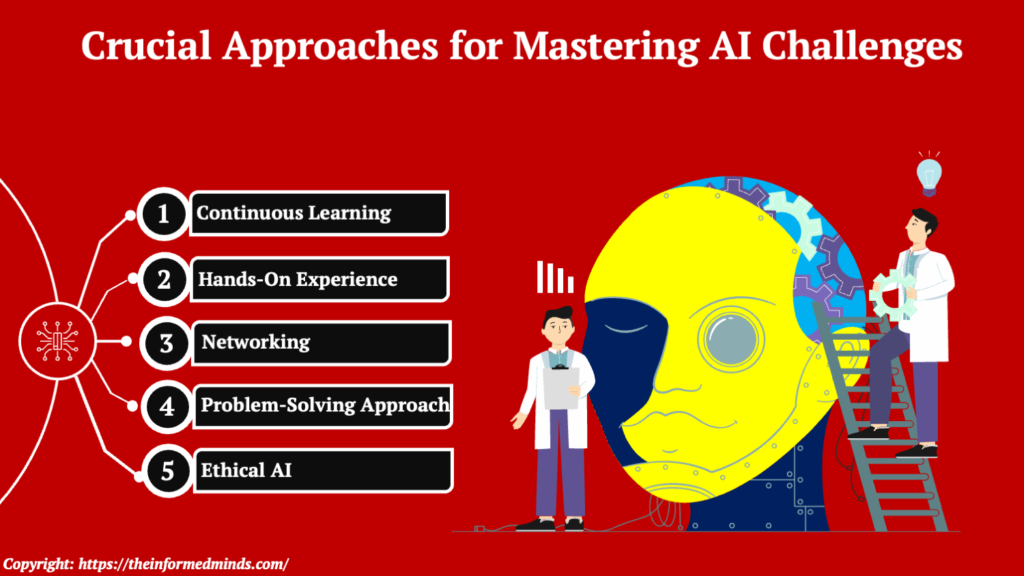To Share is to Show You Care!
In the rapidly evolving landscape of artificial intelligence (AI), staying ahead of the curve can feel like taming a beast. However, with the right strategies, you can navigate complex technical challenges and unlock your inner genius. In this blog post, we’ll explore the best approaches to conquer the AI frontier in 2023.
1. Key Strategies for Taming the AI Beast

1.1 Continuous Learning

Embrace a lifelong learning mindset: The field of AI is dynamic and constantly evolving. To keep up, adopt a mindset of continuous learning. This means staying curious and committed to expanding your knowledge throughout your career.
Enroll in AI courses and certifications: Consider taking online courses, enrolling in university programs, or obtaining certifications related to AI and machine learning. Platforms like Coursera, edX, and Udacity offer a wide range of AI courses.
Stay updated with the latest AI research and trends: Follow AI research publications, journals, and blogs. Explore AI-related news and stay informed about emerging technologies and breakthroughs.
2. Hands-On Experience
Build AI projects and prototypes: Practical experience is invaluable in AI. Work on projects that challenge you, whether it’s developing a recommendation system, image recognition model, or natural language processing application.
Collaborate on open-source AI initiatives: Many AI projects are open-source, meaning you can contribute to them or use them as learning resources. Collaborating with the AI community on such projects can enhance your skills and knowledge.
Experiment with different AI frameworks and tools: AI has a variety of frameworks and tools (e.g., TensorFlow, PyTorch, scikit-learn). Experimenting with different tools helps you gain versatility and discover which ones best suit your projects.

3. Networking

Attend AI conferences and meetups: Networking is essential in the AI community. Attend conferences like NeurIPS, CVPR, or local AI meetups to connect with professionals, researchers, and enthusiasts.
Connect with AI experts on social media: Platforms like Twitter and LinkedIn are great for connecting with experts in the field. Follow thought leaders, engage in discussions, and seek advice.
Join AI-focused online communities: Online forums and communities such as Reddit’s r/MachineLearning or specialized Slack channels provide a platform for asking questions, sharing knowledge, and collaborating with peers.
4. Problem-Solving Approach
Break down complex problems into manageable parts: AI often involves solving intricate problems. Divide these challenges into smaller, more manageable components to tackle them effectively.
Use AI to solve real-world issues: Apply your AI knowledge to real-world problems. This hands-on experience not only sharpens your skills but also has a tangible impact.
Learn from failures and iterate: Failure is a natural part of AI development. Embrace it as an opportunity to learn and refine your approach. Iterate on your models and solutions based on feedback and results.

5. Ethical AI

Prioritize ethical considerations in AI development: As AI becomes more influential, ethical concerns arise. Ensure that your AI projects consider ethical implications, such as fairness, bias, privacy, and transparency.
Understand bias and fairness in AI algorithms: Bias can unintentionally creep into AI algorithms. Learn to recognize and mitigate bias, aiming for fair and equitable AI systems.
Advocate for responsible AI practices: Be an advocate for responsible AI within your organization and the broader AI community. Encourage ethical guidelines and best practices in AI development and deployment.
2. Unleashing Your Inner Genius
2.1 Believe in Yourself
Self-confidence is a powerful driver of success. Trust in your abilities and your capacity to make a meaningful contribution to the AI field. Self-belief empowers you to take on challenges with determination.

2.2 Stay Resilient

In the face of setbacks and obstacles, resilience is crucial. Understand that failures are opportunities for growth. Stay persistent and adapt when facing difficulties.
2.3 Collaborate
AI is a multidisciplinary field that benefits from diverse perspectives. Collaborate with experts from various backgrounds, as their unique insights can lead to innovative solutions and breakthroughs.

2.4 Seek Feedback

Constructive feedback is a valuable resource for improvement. Seek input from peers, mentors, and colleagues. Embrace feedback as a means to refine your skills and refine your work.
2.5 Stay Curious
Curiosity is the driving force behind innovation. Keep asking questions, exploring new ideas, and challenging the status quo. The more curious you are, the more likely you are to discover groundbreaking solutions in AI.

Conclusion
Taming the AI beast in 2023 requires a combination of technical expertise, continuous learning, and a growth mindset. By following the strategies outlined in this blog post, you can navigate the complexities of AI and unleash your inner genius. Remember, the AI frontier is ever-expanding, and with the right approach, you can conquer it. 🚀
So, are you ready to embark on your AI journey and tame the AI beast in 2023? Let us know in the comments below!
Frequently Asked Questions
Q1: How can we overcome artificial intelligence problems?
A: Overcoming artificial intelligence problems involves continuous learning, practical experience, and ethical considerations. Strategies include staying updated with AI trends, hands-on experimentation, and prioritizing ethical AI development.
Q2: What are some solutions of artificial intelligence?
A: Solutions in artificial intelligence range from machine learning algorithms for data analysis to natural language processing for communication. Other solutions include robotics, computer vision, and expert systems, all designed to solve specific problems.
Q3: What are the 4 main problems AI can solve?
A: AI can address a wide range of problems, but four main categories it can solve include automation of tasks, data analysis and predictions, natural language understanding and generation, and computer vision for image and video analysis.
Q4: How can we improve artificial intelligence?
A: Artificial intelligence can be improved through research and development, gathering high-quality data, refining algorithms, and ensuring ethical considerations are at the forefront of AI development.
Q5: What are the 5 components of problem-solving AI?
A: The five components of problem-solving AI typically include problem representation, state space search, knowledge representation and reasoning, learning, and adaptation. These components work together to solve complex problems.
Q6: What is the most common problem in AI?
A: The most common problem in AI is the issue of bias in algorithms and data, which can lead to unfair or unintended consequences. Addressing bias and ensuring fairness is a critical challenge.
Q7: How AI and machine learning are being used to solve complex problems?
A: AI and machine learning are applied to complex problems by leveraging data analysis, predictive modeling, pattern recognition, and optimization techniques. They find applications in healthcare, finance, autonomous vehicles, and more.
Q8: What is a real-world problem that can be solved by machine learning?
A: Predictive maintenance in manufacturing is a real-world problem solved by machine learning. By analyzing equipment data, machine learning models can predict when machines are likely to fail, reducing downtime and maintenance costs.
Q9: What are the Big Five ideas in AI?
A: The Big Five ideas in AI include reasoning, knowledge representation, planning, natural language processing, and perception. These fundamental concepts underlie many AI applications.
Q10: What are the 6 problem-solving processes?
A: The six problem-solving processes often include problem definition, problem analysis, generating potential solutions, evaluating solutions, implementing a solution, and monitoring the solution’s effectiveness.
Q11: What are the three types of problems in AI?
A: In AI, problems are categorized into three main types: deterministic problems (with known outcomes), strategic problems (requiring decision-making), and stochastic problems (with uncertain outcomes influenced by chance).
The Informed Minds
I'm Vijay Kumar, a consultant with 20+ years of experience specializing in Home, Lifestyle, and Technology. From DIY and Home Improvement to Interior Design and Personal Finance, I've worked with diverse clients, offering tailored solutions to their needs. Through this blog, I share my expertise, providing valuable insights and practical advice for free. Together, let's make our homes better and embrace the latest in lifestyle and technology for a brighter future.

